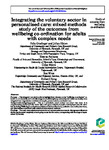Integrating the voluntary sector in personalised care: mixed methods study of the outcomes from wellbeing co-ordination for adults with complex needs
| dc.contributor.author | Gradinger, Felix | |
| dc.contributor.author | Elston, Julian | |
| dc.contributor.author | Asthana, Sheena | |
| dc.contributor.author | Myers, C | |
| dc.contributor.author | Wroe, S | |
| dc.contributor.author | Byng, Richard | |
| dc.date.accessioned | 2020-09-15T10:01:16Z | |
| dc.date.available | 2020-09-15T10:01:16Z | |
| dc.date.issued | 2020-07-14 | |
| dc.identifier.issn | 1476-9018 | |
| dc.identifier.uri | http://hdl.handle.net/10026.1/16327 | |
| dc.description.abstract |
Purpose This integrated care study seeks to highlight how voluntary sector “wellbeing co-ordinators” co-located in a horizontally and vertically integrated, multidisciplinary community hub within one locality of an Integrated Care Organisation contribute to complex, person-centred, co-ordinated care. Design/methodology/approach This is a naturalistic, mixed method and mixed data study. It is complementing a before-and-after study with a sub-group analysis of people receiving input from the wider hub (including Wellbeing Co-ordination and Enhanced Intermediate Care), qualitative case studies, interviews, and observations co-produced with embedded researchers-in-residence. Findings The cross-case analysis uses trajectories and outcome patterns across six client groups to illustrate the bio-psycho-social complexity of each group across the life course, corresponding with the range of inputs offered by the hub. Research limitations/implications To consider the effectiveness and mechanisms of complex system-wide interventions operating at horizontal and vertical interfaces and researching this applying co-produced, embedded, naturalistic and mixed methods approaches. Practical implications How a bio-psycho-social approach by a wellbeing co-ordinator can contribute to improved person reported outcomes from a range of preventive, rehabilitation, palliative care and bereavement services in the community. Social implications To combine knowledge about individuals held in the community to align the respective inputs, and expectations about outcomes while considering networked pathways based on functional status, above diagnostic pathways, and along a life-continuum. Originality/value The hub as a whole seems to (1) Enhance engagement through relationship, trust and activation, (2) Exchanging knowledge to co-create a shared bio-psycho-social understanding of each individual’s situation and goals, (3) Personalising care planning by utilising the range of available resources to ensure needs are met, and (4) Enhancing co-ordination and ongoing care through multi-disciplinary working between practitioners, across teams and sectors. | |
| dc.format.extent | 405-418 | |
| dc.language | en | |
| dc.language.iso | en | |
| dc.publisher | Emerald | |
| dc.subject | Behavioral and Social Science | |
| dc.subject | Clinical Research | |
| dc.subject | 8.1 Organisation and delivery of services | |
| dc.subject | Generic health relevance | |
| dc.title | Integrating the voluntary sector in personalised care: mixed methods study of the outcomes from wellbeing co-ordination for adults with complex needs | |
| dc.type | journal-article | |
| dc.type | Journal Article | |
| plymouth.issue | 4 | |
| plymouth.volume | 28 | |
| plymouth.publication-status | Published | |
| plymouth.journal | Journal of Integrated Care | |
| dc.identifier.doi | 10.1108/jica-02-2020-0010 | |
| plymouth.organisational-group | /Plymouth | |
| plymouth.organisational-group | /Plymouth/Faculty of Health | |
| plymouth.organisational-group | /Plymouth/Faculty of Health/Peninsula Medical School | |
| plymouth.organisational-group | /Plymouth/REF 2021 Researchers by UoA | |
| plymouth.organisational-group | /Plymouth/REF 2021 Researchers by UoA/UoA03 Allied Health Professions, Dentistry, Nursing and Pharmacy | |
| plymouth.organisational-group | /Plymouth/REF 2021 Researchers by UoA/UoA20 Social Work and Social Policy | |
| plymouth.organisational-group | /Plymouth/Research Groups | |
| plymouth.organisational-group | /Plymouth/Research Groups/FoH - Community and Primary Care | |
| plymouth.organisational-group | /Plymouth/Research Groups/Institute of Health and Community | |
| plymouth.organisational-group | /Plymouth/Research Groups/Institute of Translational and Stratified Medicine (ITSMED) | |
| plymouth.organisational-group | /Plymouth/Research Groups/Institute of Translational and Stratified Medicine (ITSMED)/CCT&PS | |
| plymouth.organisational-group | /Plymouth/Research Groups/Plymouth Institute of Health and Care Research (PIHR) | |
| plymouth.organisational-group | /Plymouth/Users by role | |
| plymouth.organisational-group | /Plymouth/Users by role/Academics | |
| dcterms.dateAccepted | 2020-06-01 | |
| dc.rights.embargodate | 2020-9-18 | |
| dc.rights.embargoperiod | Not known | |
| rioxxterms.versionofrecord | 10.1108/jica-02-2020-0010 | |
| rioxxterms.licenseref.uri | http://www.rioxx.net/licenses/all-rights-reserved | |
| rioxxterms.licenseref.startdate | 2020-07-14 | |
| rioxxterms.type | Journal Article/Review |


